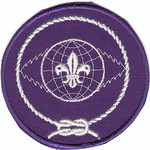My first exposure to ham radio was in 1981, as a boy scout taking part in a "Jamboree-on-the-Air." The father of a fellow scout was a ham. I don't remember too many specifics about that day, but it was one of several sparks that triggered an interest in radio that has stayed with me. (Shown above is the boy scout patch that I earned for participating in Jamboree-on-the-Air).
My father was a firefighter with the city of Sacramento, California, for thirty years. I also grew up with the television show Emergency! during the 1970's. I suppose it's only natural that I developed an intense interest in anything fire department-related. I remember, as a child, listening in with my mom as she tuned an AM/FM/shortwave/public safety receiver to local fire frequencies--sometimes we even heard my dad's engine company.
By the mid-1980's, I was an explorer scout (Explorer Post 144 in Citrus Heights, California). Our post's specialty was search and rescue; we were affiliated with the El Dorado County Sheriff's Office. One of my fellow scouts had a Radio Shack/Realistic PRO-31 handheld programmable scanner. It was like a revelation to me; I had to get one for myself. I soon had one and, once I had figured out where to find the frequencies, I was listening in on my favorite public safety agencies, particularly the Sacramento Fire Department and Sacramento County Fire dispatch.
Over the years that have followed, I've progressed through several handheld and desktop scanners as radio technology has advanced. My latest--and possibly my favorite--is a Radio Shack PRO-651 handheld with digital trunking capability.
Less than six months ago, while searching through eBay for a good deal on the next new thing in handheld scanners, I kept encountering the Baofeng UV-5R. It was a tiny little radio and, amazingly, cost less than $50. One evening, I came across an auction for one for which a starting bid had not yet been placed. On a whim, I entered a bid somewhere in the $30 range and moved on, assuming that I would be outbid. To my surprise, I won the radio for $32.
I started to research this radio that I had just won and soon came to the realization that I would need a license to be able to do anything more than just listen to it. This led to an internet search for the key words "ham radio," something that I had not given much thought to in many years. By the time I went to bed a short time later, I had ordered a copy of the American Radio Relay League (ARRL) Technician Class license manual. The rest is (recent) history.
In the end, it was a cheap Chinese radio that I didn't need that finally spurred me to get my amateur radio license.

No comments:
Post a Comment